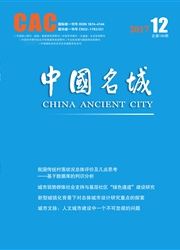

 中文摘要:
中文摘要:
一座城市就如一个人一样,有自身的形象与内涵,城市场景和气质就是对其形象和内涵的一种学术性表达。城市本身必须有自己的个性与特征,这直接影响着城市建设的成败。然而,在当下中国城镇化推进中,城市个『生与特征变得越来越模糊,“千城一面”现象越来越普遍,同质化问题越来越严重。对此,借鉴芝加哥学派城市研究最新成果“场景理论”,提出“城市气质建设”的思路,以便规避和解决中国城镇发展中出现的同质化问题。场景理论认为,生活文化设施的组合会形成不同的城市场景,场景中不仅蕴舍了功能,也传递着文化和价值特征。这种文化与价值特征正是城市气质构建的依据。考量一座城市的发展水平,不仅要看城市的GDP、市政配套、生态条件以及与个体生活密切相关的人居环境,而且更要看这座城市一脉相承的人文底蕴和文化特征,这是一座城市的内涵和精髓,也是城市气质形成的基础。
 英文摘要:
英文摘要:
A ciw, which is like a person, has its own image and connotation. Respectively, urban scenes and characteristics are the academfic expression of their images and connotation. Cities must have their own personalites, which directly affect the development of cities successfully or not. Unfortunately, during the process of urban development in China, the characteristics of the dries become more and more fitzzy, and the homogenization phenomenon is getting more and more serious. Based on the htest research "the theory of scenes" from the School of Chicago, we put forward the "urban characteristics" to analyze the problem of the urban homogenization during the development of China. According to the theory of scenes, city amenities that combined with the aid of symbolic seine can be formed kinds of "scenes" . These "scenes" not only reflect the local culture and v;flues, but also affect individtuls' attitudes and behaviors. It is argued that the scene, which contains "culture and value" . should be the basis for the construction of urban characteristics. It is believed that we not only weigh GDP, infrastures, city ecological condition and individual life, but also me~sure the cultural and values from the inside of cities when we evaluate the level of the development of cities. Because it is the essence of the cities and the basis of urban characteristics.
 同期刊论文项目
同期刊论文项目
 同项目期刊论文
同项目期刊论文
 期刊信息
期刊信息
